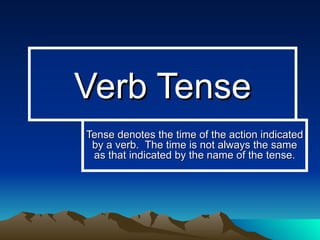
Verb tense
- 1. Verb Tense Tense denotes the time of the action indicated by a verb. The time is not always the same as that indicated by the name of the tense.
- 2. 6 Types Verb Tenses Present Past Future Present Past Future Perfect Perfect Perfect
- 3. Present Tense Present tense may express action which is going on at the present time or which occurs always, repeatedly, or habitually. Examples: He sees the train. He eats cereal for breakfast every day.
- 4. Past Tense Past tense expresses action completed at a definite time in the past. Examples: He wrote the letter yesterday. She lived to be 90 years old.
- 5. Future Tense Future tense expresses action which will take place in the future. It uses the helping verbs will or shall* and the present tense form of the verb). Examples: He will send the letter tomorrow. I shall wait here until you return. * Traditionally, shall is used for 1st person and will for 2nd and 3rd persons.
- 6. Present Perfect Tense Present perfect tense expresses action completed at the present time (perfect means complete) or begun in the past and continuing into the present. This tense uses the helping verbs has and have and the past participle of the verb. Examples: He has written a letter to his uncle. (completed action) The Waltons have lived here for seven years. (continuing)
- 7. Past Perfect Tense Past perfect tense expresses action completed before certain time in the past. (This is the before-past tense.) It uses the helping verb had and the past participle of the verb. Example: She had written the letter before I saw her.
- 8. Future Perfect Tense Future perfect tense expresses action which will be completed before a certain time in the future. (This is the before-future tense) It uses the helping verbs will have or shall have and the past participle of the verb. Example: He will have finished the paper before next Friday.
- 9. Verb Forms Verb Forms Regular Irregular
- 10. Regular Verbs Regular verbs form their past tense and past participle by adding –ed or –d to their present tense form. More than 95% of all English verbs are regular. Regular verbs cause few problems in speaking and writing.
- 11. Regular verbs and their Principal Parts Principal Present Present Past Past Parts: Tense Participle Tense Participle Verb: To call call, calling called (have) calls called To dust dust, dusting dusted (have) dusts dusted
- 12. Irregular Verbs Irregular verbs can form their past tense and past participle forms in various way. These forms cause even native speakers innumerable problems. The most irregular verb of all is the verb to be. Another irregular verb that is important for its use with other verbs is the verb to have.
- 13. Four Principal/Main Parts Principal Present Present Past Past Parts: Tense Participle Tense Participle Verb: To Be be, am, being was, (have) are, is were been To Have have, having had (have) has had
- 14. Other Common Irregular Verbs and their Principal Parts Principal Present Present Past Tense Past Part Tense Participle Participle Verb To see see, seeing saw (have) sees seen To do do, does doing did (have) done To fly fly, flies flying flew (have) flown To run run, runs running ran (have) run
- 15. Conjugation A conjugation of a verb is the correct arrangement of its form through its tenses, persons, and numbers. Person means the speaker, the person spoken to, and the person or thing spoken of. Number means singular or plural.
- 16. Conjugation of the verb: to be Tense Singular Plural Present I am We are You are You are He, she, it is They are Past I was We were You were You were He was They were Future I shall be We shall be You will be You will be He will be They will be Present Perfect I have been We have been You have been You have been He has been They have been Past Perfect I had been We had been You had been You had been He had been They had been Future Perfect I shall have been We shall have been You will have been You will have been He will have been They will have been